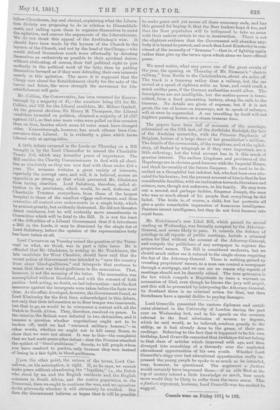Lord Carnarvon on Tuesday raised the question of the Trans-
vaal on what, we think, was in part a false issue. He is .offended that Mr. Gladstone, in writing to Mr. Tomkinson, the late candidate for West Cheshire, should have said that the recent action of Government was intended to " save the country from sheer blood-guiltiness," and interprets that sentence to mean that there was blood-guiltiness in the annexation. That, however, is not the meaning of the letter. The annexation was accomplished without bloodshed, and with the consent of both parties—both acting, uo doubt, on bad information—and the first measures against the insurgents were taken before the facts were clear. As the affair developed, however, the Government found, as Lord Kimberley for the first time acknowledged in this debate, not only that their information as to Boer temper was inaccurate, but that to go on would be to commence a contest with all the Dutch in South Africa. They, therefore, resolved on peace. In the interim the British were defeated in two skirmishes, and it became a question whether negotiations ought not to be broken off, until we had " retrieved military honour,"—in other words, whether we ought not to kill many Boors, to show that wo were not afraid. It was to this—the complaint that we had made peace after defeat—that the Premier attached the epithet of "blood-guiltiness." Surely, to kill people whom you have resolved to pardon, only because they won instead srtf losing in a fair fight, is blood-guiltiness.






































 Previous page
Previous page